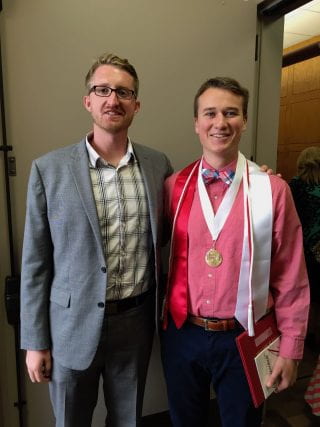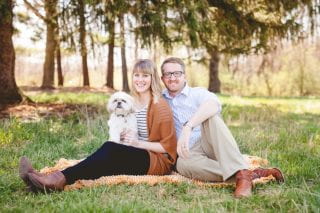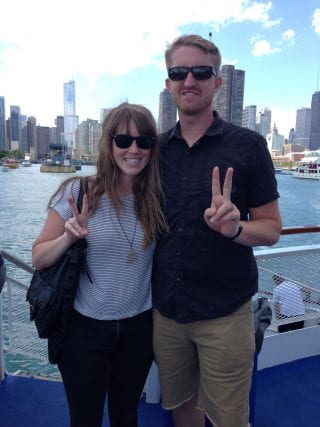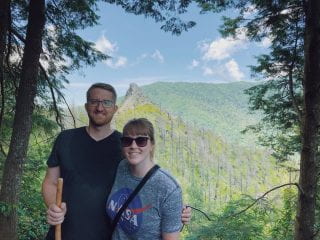A Q&A with Sociology and Criminology’s Jeff Gruenewald
Jeff Gruenewald, Ph.D.
Associate Professor in Sociology and Criminology and Director of the Terrorism Research Center
In this conversation, Gruenewald talks about returning to Fulbright College as the new director of its Terrorism Research Center, training the next generation of law enforcement and homeland security professionals, mentoring students who are engaging in original research, his love of writing and traveling, and adventures with his wife and their dog, Migo.
Q: Tell us a little about your research, academic passions and/or role within the college. What excites you about this?
 My primary research interests are in the areas of terrorism, violent extremism and homeland security.
My primary research interests are in the areas of terrorism, violent extremism and homeland security.
I have followed closely the groundbreaking work of the Terrorism Research Center (TRC) at the U of A and its founding director, distinguished professor Brent Smith, since I was a student in graduate school.
I have learned a lot by collaborating with him over the last several years, and I feel extremely fortunate to have been selected as the next TRC director. I hope to now build on his achievements by expanding the TRC’s portfolio of terrorism-related research and research opportunities for undergraduate and graduate students.
My academic passions center around applying the tools of social science to the study of terrorism and homeland security, and ultimately informing the work of those responsible for investigating and preventing the next terrorist attack.
For me the TRC is an ideal place to pursue this type of research. The TRC is in part a laboratory for training the next generation of law enforcement and homeland security professionals, and mentoring students who are engaging in original research is one of my favorite parts of being a faculty member.
I love coming to work every day and being surrounded by a team of graduate and undergraduate students who are directly engaged in the process of conducting empirical research.
Q: How long have you been at Fulbright College? What have you enjoyed most about your time here?
 I served as an assistant professor in the Department of Sociology and Criminology of Fulbright College from 2011 to 2015. I then served as an associate professor at the Indiana University-Purdue University Indianapolis (IUPUI) O’Neill School of Public & Environmental Affairs in Indianapolis from 2015 to 2019, while my wife worked to complete her Ph.D. at nearby Indiana University-Bloomington.
I served as an assistant professor in the Department of Sociology and Criminology of Fulbright College from 2011 to 2015. I then served as an associate professor at the Indiana University-Purdue University Indianapolis (IUPUI) O’Neill School of Public & Environmental Affairs in Indianapolis from 2015 to 2019, while my wife worked to complete her Ph.D. at nearby Indiana University-Bloomington.
I had the opportunity to return to the University of Arkansas Department of Sociology and Criminology as an associate professor and director of the Terrorism Research Center on July 1, 2019.
I enjoyed working at the University of Arkansas and in the Fulbright College earlier in my career, so I am very grateful for the opportunity to return.
I feel very much at home in Fayetteville, and I feel a sense of pride and energy every time I stroll up the sidewalks etched with graduates’ names and into my office in Old Main. I have always been impressed with the efforts of the University of Arkansas to balance the expectations of very high research activity and dedication to student learning and achievement.
It has been a privilege to work with several undergraduate students, graduate students, and other faculty members in the Department of Sociology and Criminology.
Q: What do you most hope your students remember from their classes and/or interactions with you?
I would hope that students remember me as a fair instructor who listened as much as he spoke and was humble enough to admit when he didn’t have the answer.
I hope that my students will take with them the skills they develop in my courses to be more effective writers.
As we move deeper into the digital age, I hope that students remember to pause and reflect on where the information they consume is coming from.
Q: What do you like to do during your time outside of the university?
 I actually feel most relaxed when I’m working and in the writing flow. It is when I’m not working that I’m trying to figure out how to relax. I will usually either pick up one of the many books on my list to read, exercise, or my wife and I will try out a new coffee shop or restaurant in town.
I actually feel most relaxed when I’m working and in the writing flow. It is when I’m not working that I’m trying to figure out how to relax. I will usually either pick up one of the many books on my list to read, exercise, or my wife and I will try out a new coffee shop or restaurant in town.
When at home, my wife and I spend quite a bit of time caring for our dog, a 12-pound ShihTzu named Migo. We have slowly evolved into people who regularly buy their dog gifts and pretend to speak for him in funny voices. I’m not exactly sure how it happened, but we are okay with it.
We also enjoy traveling. When we are not traveling back to visit our families in Indiana, we try to travel outside of the country. This year, we traveled to London and Tokyo. We have a long list of international destinations we would like to experience, so I imagine we will continue to travel in the future.
As we have not lived in the Northwest Arkansas region very long, we hope to visit more local spots as well.
Q: What’s up next on the horizon for you?
 The TRC just finished a large-scale project examining the longevity of terrorists, and currently has two ongoing multi-year terrorism-related projects funded by the National Institute of Justice.
The TRC just finished a large-scale project examining the longevity of terrorists, and currently has two ongoing multi-year terrorism-related projects funded by the National Institute of Justice.
Much of my time over the next few years will be spent working with TRC assistant director Katie Ratcliff and our team to collect, code and analyze new terrorism data and transition our findings to homeland security professionals and into academic articles.
I am very excited about both of our ongoing projects.
One project involves building a web portal, known as the ATSCoRR (American Terrorism Study Court Record Repository), that will provide law enforcement and intelligence analysts easy access to original data and information related to terrorism patterns and trends. We are already getting positive feedback on the beta version of the portal.
Another project involves utilizing new Risk Terrain Modeling (RTM) software that will help us create models to assess risks of terrorist planning and attacks for certain geographic areas.
The TRC will also expand its scope to include the Bias Homicide Database (BHDB), which I have directed for the past several years. I view violent hate crimes as one form of domestic terrorism, and I am excited to see what opportunities are created for student research, faculty collaboration, and external funding by integrating the BHDB into the TRC.
The study of terrorism intersects with other innovative research areas at the University of Arkansas, including data analytics, crime science, and GIS.
As the new TRC Director, I plan to introduce a series of educational and training opportunities for students, and to explore how the TRC can better collaborate with other research centers on campus doing these types of work.
Q: Is there anything else you’d like to add or let readers know?
 At my core, I am a first-generation college graduate who believes whole-heartedly in the power of education to change lives for the better.
At my core, I am a first-generation college graduate who believes whole-heartedly in the power of education to change lives for the better.
I know that I would not be where I am today without a few people along the way opening a door for me.
As an educator, I now believe that it is my responsibility to help inform, recruit and clear obstacles for others in under-represented groups to achieve their dreams by graduating from the University of Arkansas.
Andra Parrish Liwag
Director of Communications, J. William Fulbright College of Arts and Sciences
479-575-4393 // liwag@uark.edu

